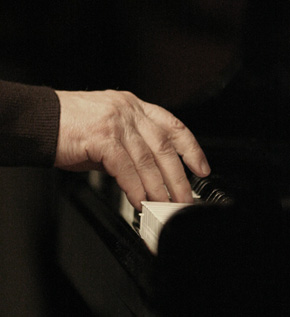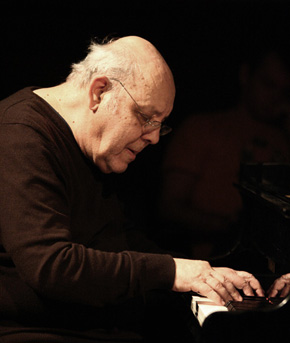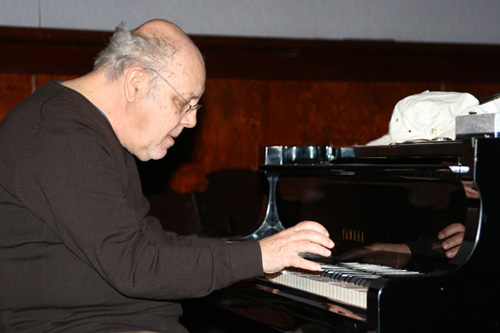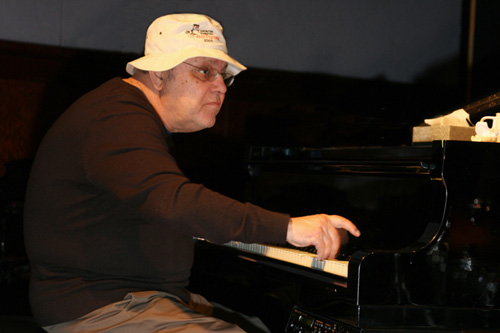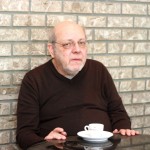©Laurence Svirchev
During the June 2007 TD Canada Trust Vancouver International Jazz Festival, I had a fascinating conversation with the Dutch composer-pianist, Misha Mengelberg. The call and response discussion, with Mengelberg of course calling the dominant chords, ranged through his personal history, how and why he formed the ICP (Instant Composers Pool), his astounding critique of Charles Mingus and candid appraisal of Cecil Taylor’s pianisms, his love for the music of Herbie Nichols, the musicianship of George Lewis, and ancient Chinese philosophy. His vocabulary and method of stringing English sentences together sounded quite like his music, at times disjointed or missing some seemingly obvious connector, but again like his music getting to the point of a satisfying coherence even if the thought was deliberately posed to invite Damocles’ sword to fall upon it. To further confound things, he often uses a double-negative to make his own point and challenge Damocles. Even if somehow one could not agree with an opinion of his, it was difficult if not impossible to counter-point it so solid was his thought process. If, in reading some of these opinions, you become outraged, try counter-pointing that annoyance to Mengelberg’s disparaging opinion of his own piano playing.
The flavor that resorts from a Mengelberg soup is a cross between the ancient Taoist who magically manipulates the universe, and the younger Buddhist who accepts with resignation what the universe has rendered. Following are excerpts from that conversation.
Laurence Svirchev: What would you like to talk about?
Misha Mengelberg: Not about nothing.
LS: Did you do any science?
MM: I first tried two years of architecture and made a little studio for making electronic music. In 1958-59, at the same time I was in the conservatory in the Hague, and studied harmony and counterpoint, both things I liked to study. Counterpoint is a dead system of composing, you could say, which is not much followed anymore. Are you familiar with this?
LS: Sure, thesis, anti-thesis, synthesis. Why did it go away, this is good stuff?
MM: It’s excellent stuff, and this is the reason why some younger people are taking it up again.
LS: What’s the difference between counterpoint and call and response?
MM: Counterpoint gives advice and when you fail to take that advice you are punished. It means point, counterpoint, that’s note versus another note. That is what it is about, the whole universe reduced to tones, sounds.
LS: Ah, yes, the universe. I did a CD review of a group that played last night called “Indigo Trio.” I researched the word indigo, the dye, the plant, the ancient people who used it. I found that Isaac Newton, the physicist, the founder of the calculus…
MM: … One of the founders, Leibniz was the other…
LS: … One of them, yes, you’re right. Newton was fascinated by the motion of the planets. At that time seven planets were known. Newton also counted seven colors, one of which was indigo, a color which he felt corresponded to one of the seven notes of the major western scale.
MM: Ah, that’s good thinking!
LS: I thought that was a good reflection of his times. But now we are stupid, we only talk about three primary colors.
MM: [Laughs]. Colors seem to have a certain presence, but mostly in design, but not as matters of fact in nature. Design on paper, part of a paper world, a paper universe. We see more than three colors in rainbows and the like. That is, a rainbow is another dimension than a piece of paper.
LS: What were your compositional methods?
MM: I started by listening to my teacher, Kees van Baaren. He was the first twelve tone composer in Holland, a very good teacher He was also an expert in Fats Waller’s music. In a way, I preferred him to Fats Waller, not because he was very brilliant in making jazzy compositions, but because he was a very good methodist in making rows of chords having to do with each other, having a logic for chord progressions. That style has a name which I always forget, but you know the name, [moves his hands as if playing the piano].
LS: Stride?
MM: Yes, stride piano, that’s the word. He was the most brilliant stride player I ever met. In the pre-war days, 1937-38, he had a program on Dutch radio for a half an hour a week to play his stride piano. He used songs that everybody knew and played them in a stride piano style. I never actually never heard his show because I was only two years old when we came back from Russia.
My father and Kees van Baaren played in the cinema together in the 1920’s in Berlin, they were old friends. He played at my parent’s 14th wedding anniversary. It made me think that ‘when I want to study music, which will possibly be one these years, I will go to him to study.’ I wanted to know the secrets of his piano stride playing.
And he told me the secrets of his piano stride playing. It’s more or less a simple harmonic thing that had to be looked after: don’t use those fundamentals all the time like Fats Waller did. He was right. The music becomes better and more interesting when you use the seventh chords and the sixth chords, sometimes the triad, but without the fundamental in the bass. You leave that to a bass player who has not the skill to play those other chords. But it is also possible there is no bass player at all. When you really had the possibility to play the right chords, that is the sixth chords and the seventh chords and not always those fundamentals in the bass, then you bring this type playing to higher level.
That is what Kees van Baaren did and that was my first lesson in the harmonic art form called stride piano.
LS: When you say a “higher level” what do you mean?
MM: A more musical expression is present. In the later years the players who played in that style recognized what my teacher had said. You hear sometimes Oscar Peterson play in that style. And there were others smart enough to make a trial of that. They changed in the 30s from playing little primitive chording, effective but primitive, into something of a different level.
LS: From the point of view of piano technique, does leaving out the fundamentals contribute to speed?
MM: No, not for me. Because I am such a lousy piano player that nothing would help me to speed up my style in any way. I can speed up by not listening to myself and playing only rhythmical things, motifs that I think have a meaning in themselves and are useful to whatever you do on the piano. I can play any standard, any chord progression and make something out of it that swings. That is something I have heard and did not learn. I never tried to swing. But when you do those things that my teacher did, there is a swing involved. You get it for nothing. So I seem to swing.
I think it is unnecessary to have that swinging feeling when you are busy with some kind of musical thought. You think: ‘maybe that’s nice, but let’s not make a point of this.’ So I can play swinging and un-swinging music, ultimately without thinking about it.
LS: In terms of life progression, you learned certain things in the conservatory. Did you go into the more advanced things, twelve-tone scale, Morton Feldman….
MM: Of course! I had a strong influence from Igor Stravinsky in my starting years. I thought most of the jazz music was too primitive to make me happy. I found finally those better chords partly when I found some Thelonious’ [Monk] music. I was more amused than when I listened to, say, Bud Powell. He had some interesting moments, but not of the type I was looking for. I tried from time to time to play also Bud Powell type of music because it was a rhythmically interesting thing to do, but since there was no mirrorization of that speed & rhythmical thing, I was on the look-out for something else.
I was looking for some swing but not specifically a tempo, and not specifically a tonality. I tried to do that in the ‘50s but there was nobody who could follow me there. I was in Germany at the time in a nice band with a very good Dutch bass player who later laid down the bass and went to work in a factory in Germany. That was a pity because he was really capable of following what I was attempting at the time. But he said, ‘We are not going to make any money at all from what you are doing.” I told him, “I am very convinced that we will make a lot of money with this technique of no tempo, no tonality. That must be the case.”
And it was. I think I brought more money in by doing that later on than by anything else, like studying all those be-bop phrases. So I never really learned to play be-bop really well. But I knew the rhythmical aspects of it and I knew that I would have other harmonic things that would take over the rush of playing jazz music.
LS: How about twelve-tone compositional approaches?
MM: I made two pieces in twelve-tone style but then simply left it for what it was and then went into free atonality. It is something without definite method, but with an ear for the unexpected in whatever music. That started in the early 60s.
LS: In that period, there were a lot of musicians thinking that way.
MM: That was exactly the moment that I put my back to the old swing music and went into developing my own things that I had already partly found on my own. But I found that I did not have any methods to exploit it properly. Then I said to myself, “I don’t want to have a list of things that need to be done in music. I want to have total freedom to associate musically and to make things that had not been done until that moment somehow clear in my music.
But that also gave a set, a very small list of things that I wanted from the music. I didn’t want a typical twelve-tone option. I did not want to repeat too much. So I tried to make chaos on the piano that a very keen ear for “Didn’t I play this A-flat in the last 3 seconds of the music? Can I use it still?” Things goes faster than I even think them nowadays. I can play twelve-tone rows that are not pre-conditioned. I can start somewhere and then I think I have all twelve of them and can do something new with the same material I have already used.
Then I came to an understanding that I didn’t like to play on well-tempered pianos. I wanted to treat the piano as a thing you hit and not a thing that you make those beautiful melodies. I do that still. It is something that belongs in my style of playing.
And it is not the style of playing of Cecil Taylor. Cecil Taylor doesn’t think like that. He is not interested in twelve-tone music and he is not interested in not repeating what he just did. He doesn’t mind using the same chords or little melodies over and over. That is one of the things that becomes a weakness in his playing, I think.
He is an interesting piano player, and I am not. There are things I would never do in his style of playing. Then there is his formula of playing one hour and then he stops. He has repeated everything 5000 times. Me, with another type of ear, after forty minutes, I have seen what he is doing and what he is going into. He is going into repetition. I hear repetitious stuff coming into the din.
I have said to him “You should make your one hour into forty minutes because you start repeating yourself. For the style, that’s not so good for the style.” Then he said, “Fuck off with your remarks, I play what I play, and that’s all.”
I said, “I do not doubt!” and I stopped bullying him immediately, because of course he should do whatever he wants to do. I backed off and we found other items to discuss.
In one thing, however, I was a little strict towards Cecil Taylor. “Why did you ever stop playing with Sonny Murray?” He was the best to playing with what you do,” I said.
Cecil Taylor said, “Well, well, well. How do you know that?”
I told him Sonny Murray is somebody who is, ah, “’lazy’ is not the word. Murray is circumspect in his movements. He listens and make little noises that have no function except to pass the time. But then after twenty minutes or twelve minutes, it depends, he starts to comment on the things that Cecil Taylor did in his opening bids. You won’t hear the translation into the drums for some time. But at a certain moment Sonny Murray begins repeating what Cecil Taylor played at the beginning. He continues that into something of his own way of playing the drums. And that factor I miss in all the later things Cecil Taylor played when he played solo or with a drummer that I don’t like.
LS: When you reached the point you decided to do what you wanted to do, was there a social or a political context?
MM: No! there was nothing! I’m sorry to use that word twice, but there was nothing of the type. Even Albert Ayler who I heard when he came to Holland in 1964, the stuff that he did I loved. I found it, in a way more, more interesting than Cecil Taylor. I thought Albert Ayler was the real thing for me in the development of improvised music. Maybe is still, because there were no people of that stature who followed him. You may say that Eric Dolphy was someone similar to what Albert did in the early 60’s. But Dolphy didn’t want to play a type of experimental music with us, with the trio he founded in Holland, so I learned him to play “Epistrophy.” I didn’t really like his own compositions. But when he took the bass clarinet, and just played, I was totally convinced Dolphy was a great player.
Both Han [Bennink] and I hated Dolphy’s flute playing. I did not like it, it was not fluent enough for me. In flute playing you should also make hooks to make it good. But there is one flute player who has a natural fluency that I like. He played with Count Basie but I forget his name. I’ll have to give myself some bangs on the head to remember who. He was also a tenor player in the Basie band.
Jerome Richardson! He had the right tone. He never played any experimental stuff. He was interested in playing jazz with this tone. I never spoke with him, but if I had I would have said, ‘Listen, you have the tone that could be the follow-up of the Dolphy style. With your flute, please do!’
LS: And you didn’t.
MM: I never spoke to him, never went to Basie’s concerts to say something. Basie’s band is not bad. I like even when I hear some of their stuff on CD, it’s simply not my music, and that is very obvious. Even when Richardson plays tenor saxophone in the Basie band, its very nice, but nothing special.
LS:I listen to Basie all the time but not the big band.
MM: You should listen to Richardson.
LS: I have heard him. Gunther Schuller presented a concert of Charles Mingus’ music called “Epitaph” in which Richardson played.
MM: That’s a bad idea, I think. Charles Mingus’ music does not exist! [laughs]. I’m sorry, but I cannot help myself there. Whenever I am consulted about jazz music, I say exactly what I think.
He was not even a real jazz musician. He had the temperament maybe, but that was too much. The temperament was not OK. He could play very loud on the bass, but it had nothing to do with jazz music. Even the only time he did something that I could listen to without immediately shouting “Away with that stupid music!” was the concert Charlie Parker and Dizzy Gillespie did at the Massey Hall in Canada. Fantastic record and excellent playing by, I think, Bud Powell. This disk is a real gem. And here is this unhappy bass player playing his ears off into making something behind those amazing players. That goes to a certain measure not completely wrong. I’m even hesitating to say that. I try to listen to that record one or two times a year. That happens sometimes in some years, sometimes not.
I always come to the same conclusion. This is the only record where that funny bass man does something which is not ridiculous. I think he is ridiculous most of the time. [laughs]. When you are ridiculous most of the time, it gets on your nerves, it doesn’t help to stay calm in appreciating the things that go not wrong.
LS: What you are saying makes me laugh! Mingus had a tune called “Fables of Faubus.”
MM: Oh yes, I remember that tune. It’s a good tune.
LS: And when he played that tune he would say, “Dannie Richmond, name someone who is ridiculous.” And Danny would say the name of some southern American racist, cracker politician. Good, and funny commentary on racism. In one of his bands, he had a pianist named Jane Getz. When Mingus said, “Jane, name someone who is ridiculous.” She would say “Mingus!” She didn’t last very long in the band.
MM: [Laughs with delight] Very good! Mingus was like that. Well, well, well! People still listen to him and don’t understand that he is ridiculous, but it will come. With the years, people will finally observe that. He was an absolutely ridiculous cat. Maybe he was sometimes not unsympathetic. There is a word that Americans use that is even a better conclusion: the word is ‘pathetic.’
LS: Ouch!
MM: Yes, that seems to be a very negative word. Don’t think that! Because there was a very good composer in the 19th century who wrote a symphony called “Pathetic” [Pathetique]. That means “with pathos.” And pathos is great, big feelings. The composer was Tchaikovsky. The piece is a masterpiece. So ‘pathetic’ is not always a negative.
LS: Well, Mingus had great feeling, no question about it. And great passion.
MM: Yes, I agree. And great passion. But not the means to store that in a more or less withdrawn setting that is necessary to make things clear for others than himself. You must give some room for people to make out something of an opinion about what is happening here, what is going on here besides this crying and humping bass player.
Well, I think that Parker and Gillespie both meant business. And they were both so good at it as to make the bass player irrelevant. And not so disturbing that he that you couldn’t get him out of the band on that occasion. That would have been impossible. You can listen to Mingus as an interesting bass player in his own atmosphere. I say, “Please, fuck off, go away from Massey Hall and do your thing with your people!”
LS: How long did you work with Steve Lacy?
MM: Well, we did work all the time, beginning at the end of the sixties, and even sometimes in the nineties, I think. There were George Lewis and others as well. George makes everything in his vicinity better than they are. He has a very good instinct for knowing if somebody is not going astray in the music. He had that influence with Steve. Steve didn’t go astray in the things he played with us. We did a very good Herbie Nichols record (Change of Season, Music of Herbie Nichols, Soul Note) and we did some okay Monk sides that was possible with the presence of George. George Lewis made all that possible. I even could play choruses in tempos that I never dared to touch without much trouble.
George gives me peace of mind, somehow. He also gives me the impetus to do something, to be at the business at hand. He is a good influence.
LS: What was the attraction of the music of Herbie Nichols?
MM: Herbie Nichols was a forgotten genius. I did welcome him with much applause when he his records came out in 1955, and so did most of the critics. The critics were jubilant the moment Nichols came with his stuff with Max Roach and some very OK bass players. Also the Art Blakey stuff is not bad at all. Max Roach was much better than Art Blakey in terms of the precision required to play those pieces. But that was not something that Herbie Nichols was caring for. He was caring for the massive feeling of ecstatic ways Art Blakey was trying to find holes in his pieces. Good stuff, without any doubt!
LS: ICP was founded when?
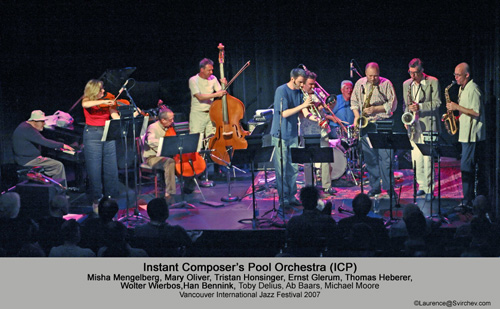 MM: It was founded in ’67. With Willem Breuker, who did not think we would last more than a year. There was Han Bennink, and me. That was all. It was a good trio. We played without a bass. Martin Altena played with us in the very beginning. But then one day I forgot to mention him in an article on ICP and he was so mad at me that he left the organization.
MM: It was founded in ’67. With Willem Breuker, who did not think we would last more than a year. There was Han Bennink, and me. That was all. It was a good trio. We played without a bass. Martin Altena played with us in the very beginning. But then one day I forgot to mention him in an article on ICP and he was so mad at me that he left the organization.
I didn’t do that on purpose. It was just a function of my chaotic mind. I said, “You know that, Martin. I am not to be trusted, and certainly not with people from the press who make some general little articles about ICP. So please don’t be so fond of vengeance in this case.”
“No!” he said, “I’ve made up my mind!” [laughs].
LS: A trio, and then?
MM: Even the trio split up because Willem wanted to have his own organization. I expected that. I didn’t expect that he would spend his life under the wings of the Instant Composers Pool. So he went. He made his balkanized pieces and improvised with great instinct. He liked us and we liked him in what happened after he left ICP.
Slowly, Willem made his balkanisms the way how he made compositions and told people to play in their improvisations what he liked them to play. That is something that is opposed to my ideas of improvisation. I have never told any member of ICP how to play when they improvise. I have no wish to do that. If I died on the spot, they would just play the right things for the rest of the concert.
LS: Did you ever hear Roland Kirk? He would say during the concert, “When I die, I want them to cremate me, mix my ashes into a big bag of pot, and then have everybody smoke me!”
MM: [Laughs] Not so bad! A good formula. I wouldn’t recommend that for me, because I like my pot to be of the most profound quality!
LS: When did you expand out of the trio format into a larger band?
MM: In 1972 for the first time. I thought maybe it would develop into a little orchestra or it would disappear without anybody noticing even. To my enormous surprise it seemed to grow. Then I started thinking, “What will I do with a small big band? Do I want that to happen at all?” The first years were traumatic in a way. I recorded and recorded and recorded and nothing came out that I would like to be published, ever!
Finally, I made a recording that partly had some interesting material. That recording was Tetterettet (ICP 10). It’s the first band you could call an ICP band. Tetterettet is also the sound of a trumpet that is turning loose like an elephant [makes blaring sounds]. That is what elephants do if they are really fucked up. The French word for brains is somehow a part of it. The name of something of a unit that thinks and plays at the same was born. And that tête is ICP still. They are able to play and improvises and think about nothing and suddenly they have something. That something I leave with them and they can do with it what they want. They can make a piece out of it and then everybody has to play the things that that person has invented or they can say “No, we don’t want to play any of the themes that have been given to us. We simply don’t have the time to do that because we want to do other things we want to do.
That happens alternatively with all those pieces. They can be used as little exercises somewhere within the framework of improvisation or they can be seen as little pieces that can be seen as boats in a sea of chaos, or something like that. This is an ambivalence that I like. That is the basis of how ICP plays. It started with me writing down those little pieces I had, and then telling the eight other people (in ’74) “You don’t have to make any commentaries on the things we have just studied and practiced, you can do anything you want with it. You can also neglect it, something that I advise strongly to do!
That advice that was taken seriously. Because I did not want them to be like a little cuckoo clock, doing what the Swiss government [laughs] wanted them to do. The formula works very well, still. There is nothing I want to change very much. In the near future, I’m going to make some little pieces in the near future that have that funny thing that you can take fragments from it or neglect it. Little variations on that thought. I don’t know yet how or what.
Laurence Svirchev has reviewed Mingus’ 1959 Columbia recordings. For his own perspective see Mingus on Columbia and Tijuana Moods
